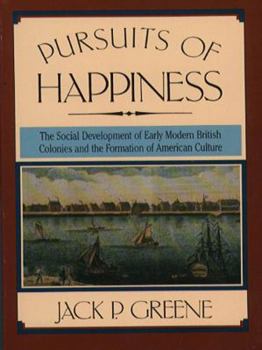Pursuits of Happiness: The Social Development of Early Modern British Colonies and the Formation of American Culture
Select Format
Select Condition 
Book Overview
In this book, Jack Greene reinterprets the meaning of American social development. Synthesizing literature of the previous two decades on the process of social development and the formation of American culture, he challenges the central assumptions that have traditionally been used to analyze colonial British American history.
Greene argues that the New England declension model traditionally employed by historians is inappropriate for describing...
Format:Paperback
Language:English
ISBN:0807842273
ISBN13:9780807842270
Release Date:October 1988
Publisher:University of North Carolina Press
Length:301 Pages
Weight:1.09 lbs.
Dimensions:0.9" x 5.9" x 9.0"
Customer Reviews
2 ratings
Virginia, not New England, is the appropriate Developmental Model
Published by Thriftbooks.com User , 18 years ago
In erudite and responsible fashion, Greene establishes his thesis by first laying out the nature of the Chesapeake and New England colonies. Virginia, he states, was the result of profit-driven members of The Virginia Company, and therefore a commercial colony from the beginning. It furthermore was an individualist colony and only accepted the idea of a community after realizing it otherwise would not succeed. By contrast, New England was a religious colony wholly devoted to the community, where not until later was any individualism expressed. Having laid that foundation, he then proceeds to criticize the declension model of New England and to propose a developmental model for the Chesapeake. His criticism of the declension model rests principally in that it assumes a deterioration of New England culture and quality of life. As such, it cannot properly address the demographic and economic changes occurring in those colonies beginning around 1660. Having thus assessed the validity of the declension model, he then proposes his own developmental model for the Chesapeake region. That model states, in essence, that permanent civilization grew out of temporary colonies by virtue of the change from strictly individual, go-it-alone pursuits to the much more practical individual-within-a-greater-community approach. That latter phenomenon, he demonstrates, is a reflection of life and the socioeconomic situation in Great Britain itself, thereby proving that not only does the declension model fail to hold for the Chesapeake colonies, it was never representative of the Old World either. He then goes on to describe the socioeconomic nature of the colonies in Ireland, the Middle Colonies around New York along with the Lower Southern colonies beneath the Chesapeake, and the island colonies in the Atlantic and Caribbean. In each case, he ultimately asserts their strong similarity to the Chesapeake colonies and the legitimacy of his developmental model theory. In his final chapter, he brings all the colonies together to explain the creation and development of an American society, and the colonial move from separate and distinct colonies to united and similar states. The style of Greene's argument is very satisfactory; he makes no assumptions, or at least pretends not to, and fully and somewhat repetitively explains how each colony is similar to the Chesapeake and dissimilar to New England. It is constructed, therefore, so the scholarly reader can jump to the colonies of interest to him/her, skip over the others, and still fully understand the argument. The argument itself is highly intriguing, and well grounded within the evidence he presents. One cannot help but see the merit to what he writes. That said, there are a few points of caution for the academic reader. First, Greene pays no attention whatsoever to Indians, and less attention than he should to slaves. On Indians, he acknowledges as much in his introduction; however, with t
Pursuit of a New Paradigm
Published by Thriftbooks.com User , 24 years ago
Greene is on a mission to show that the South (especially the Chesapeake) represents the "normative" model of American development-not the New England model. To do so, he decries the standard "declension" model, based on the history of Puritan New England, and produces a "developmental" model that he proves was normative for all British New World colonies--here New England represents the exception, not the rule. He seeks to analyze three points. First, to analyze the assumptions that have emphasized the preeminence or normative character of the Orthodox Puritan colonies of New England in the early modern social development and formation of American culture. Second, to evaluate and compare among the experiences of other societies in the early modern British Empire and to formulate a model of colonial social development that made be more broadly applicable than the heretofore used declension model of British colonial history. Finally, to delineate the process by which the general American culture began to emerge out of several regional cultures during the century after 1660 and identifying the most important elements in that emerging culture. Colonial historians have used the declension model to explain the early experiences of the Orthodox European colonies of Massachusetts Bay and Connecticut. Greene proposes a developmental model which looks at historical change in new societies as a movement from the simple to the complex. The Chesapeake, being the oldest settle the region, experienced this model first and the others followed - except the New England region, which was atypical from all other British colonies. Green does not discuss Native Americans, and only superficially covers slaves. However, he admits to pursuing his argument with three assumptions: 1) the focus of the book is upon social development and religious, political, and economic developments are considered only as far as their social dimensions are concerned; 2) focus is upon European and African immigrants and their descendants - excludes Native Americans; and 3) attempts to avoid the "idol of origins" which assumes how an area appeared later in time was equivalent to how it began (concerns the subject specially of slavery in the South). An excellent book for any student of American history, it is well written and thoroughly researched. It discusses the major historians and arguments concerning colonial American history.





